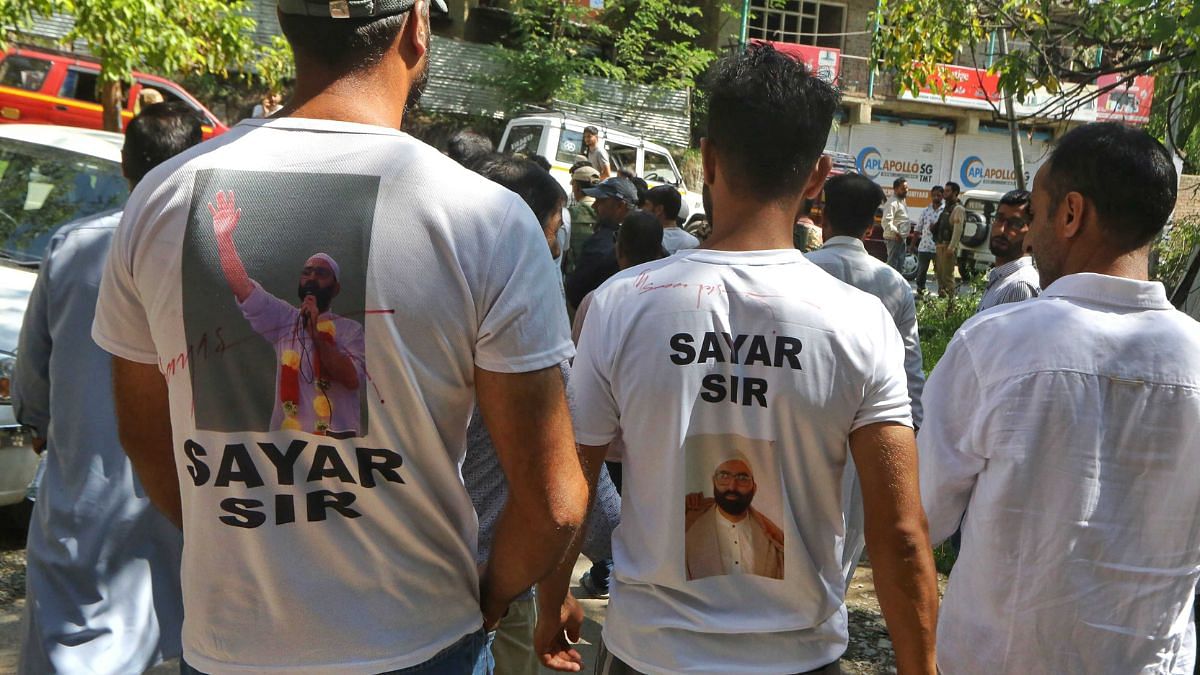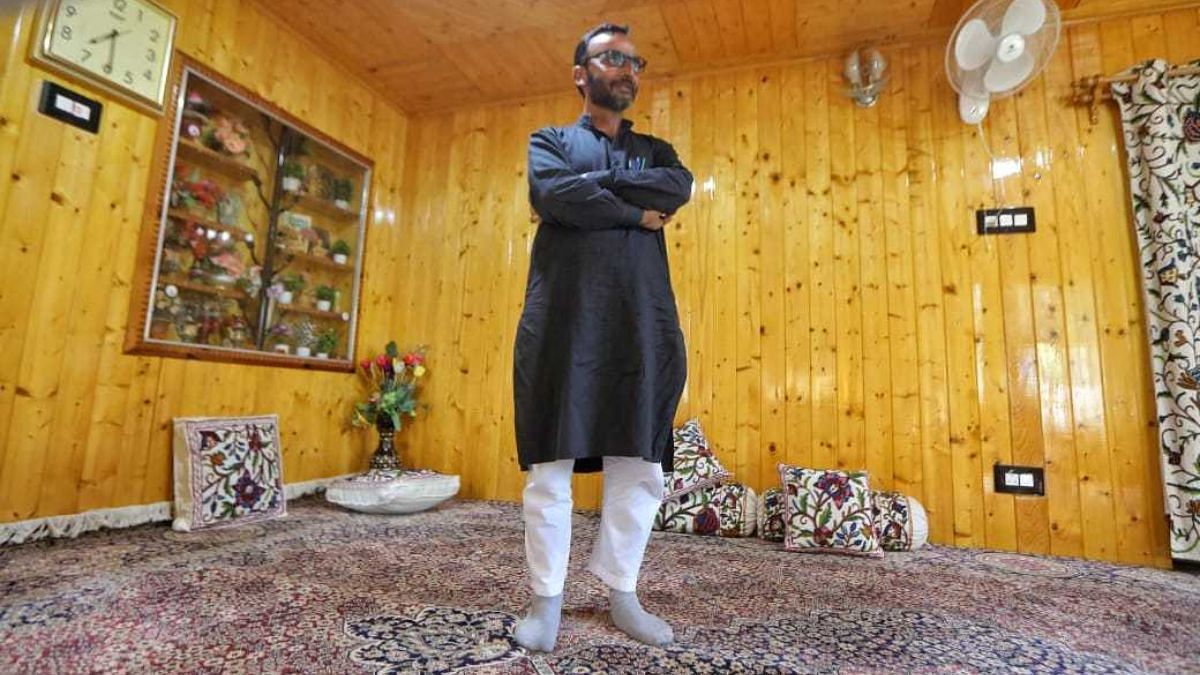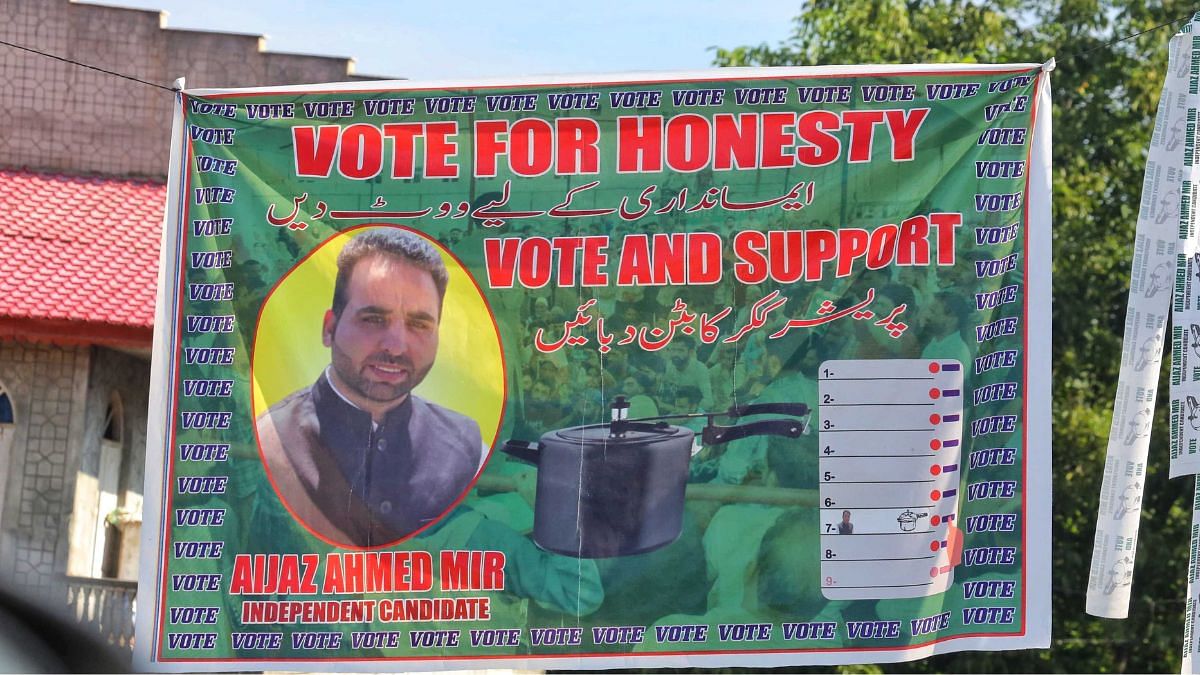And these candidates are drawing huge crowds at their rallies, giving veteran leaders a run for their money.
Jamaat-backed Sayar Ahmad Reshi is proving to be a challenge for the region’s only Communist party leader, the Communist Party of India (Marxist)’s M.Y. Tarigami, who has won four assembly elections in a row since 1996.
In a sign of his popularity, throngs of people gathered in Kulgam on 8 September for a joint rally held by at least four other Jamaat-backed candidates to canvas for 42-year-old Reshi, who headed the Jamaat’s education wing in the district, Falah-e-Aam Trust.
Jammu & Kashmir will vote for a 90-member assembly in three phases starting 18 September and the results will be announced on 4 October. It is the region’s first assembly election in 10 years.
The main parties in the fray are the INDIA bloc’s National Conference (NC) and Congress, the People’s Democratic Party (PDP) and the Bharatiya Janata Party (BJP).
This election also has the second-highest number of Independent candidates since 2008.
The Jamaat now also has the support of the Awami Ittehad Party (AIP) headed by Lok Sabha member Sheikh Abdul Rashid, also known as Engineer Rashid. Former Jamaat members and AIP have come together in a strategic alliance for the assembly polls.
Noor Ahmad Baba, a Srinagar-based political scientist, said the Jamaat’s move might have some impact in terms of eating into the vote share of other parties but it is unlikely they will win seats immediately.
“Naturally some impact will be there. Looking at their history in electoral politics, which was many years ago, they have had some degree of impact in electoral politics but not beyond that. Some of its candidates may end up giving a stiff competition to the other candidates,” he told ThePrint.
“They have a committed cadre but they have not been able to inspire voters in the past. If they are able to do it this time, we will have to wait and watch.”
Also read: Bangladesh Jamaat-e-Islami can’t go far with anti-India rhetoric. It must address its 1971 role
Jamaat’s political past
Though the Independent candidates backed by the Jamaat have created a buzz on the ground, this is not the first time it has entered electoral politics.
The Jamaat was active in Jammu & Kashmir’s electoral politics until the 1987 election boycott after allegations of widespread rigging.
It contested parliamentary elections in 1969 and 1971, and panchayat elections in 1969 and 1974 in its own name. In 1963, Jamaat-backed Independent candidates had fought in Panchayat elections.
The party’s patriarch, Syed Ali Shah Geelani—who died in 2021—was a three-time member of the legislative assembly.
But in the 1990s, it stayed away from elections in Jammu & Kashmir as it became more associated with separatist groups in the region.
The government banned the Jamaat months before Article 370 was scrapped in 2019 for being in “close touch” with militant outfits and to prevent “escalation of secessionist movement” in Jammu & Kashmir.
And in February this year, the Modi government extended the ban under the anti-terror Unlawful Activities (Prevention) Act (UAPA).
It said the Jamaat “is continuing to be involved in fomenting terrorism and anti-India propaganda for fueling secessionism in Jammu & Kashmir, which is prejudicial to the sovereignty, security and integrity of India”.
The government notification said many criminal cases had been registered against Jamaat-e-Islami and its members in Jammu & Kashmir under various sections of the law, including UAPA.
Now, the Jamaat has sidestepped the ban and re-appeared on the political scene in the region with the 10 Independent candidates it is backing.
Apart from Reshi, other Independents include a former agriculture department employee with a PhD, a former People’s Democratic Party (PDP) candidate, an engineering graduate from NIT Srinagar and a retired government lecturer.

Four Jamaat-backed candidates are in the fray in the first phase on 18 September, one is fighting in the second phase and five more have filed their nominations for the third phase.
“The move to field Independent candidates is a tactical call taken to show the government of India that [they] are primarily a socio-religious organisation and have detached [themselves] from Hizbul Mujahideen,” a government official told ThePrint.
“But the government is not entirely convinced and so has not lifted the ban.”
No ‘radical departure’ in Jamaat’s position
While many welcome the Jamaat’s move to enter the electoral process again, albeit indirectly, security experts say its theological and political position hasn’t changed dramatically.
They also believe the organisation’s foray into electoral politics at this juncture is “opportunistic” and aimed at expanding its ideology.
Counterterrorism expert Ajay Sahni cautions against the Jamaat’s entry into the electoral process, saying it had been at the “root of radicalisation and terrorism’ in the region”. “There is no radical departure in their positions or their ideas,” he told ThePrint.
The Jamaat “is an extremely problematic group and any extension of its role in the politics of Jammu & Kashmir can only produce negative results that has been the experience of the past,” he added.
When asked why the Indian government is allowing Jamaat to contest indirectly, Sahni said, “The present regime is only interested in undercutting the electoral prospects of these established political parties in Jammu & Kashmir, irrespective of the national cost that may be inflicted thereafter.”

Sahni added that the chances of the ban on Jamaat being lifted depended on how it conducted itself and the electoral calculations of the government at the Centre.
“Jamaat is the root of almost all radical groupings (that have emerged from them). Their leadership has come from either Jamaat cadres or ex-cadres,” Sahni said.
“Whether they have completely changed their orientation and role and abandoned their ideologies of separatism and extremism is something that we have to look at in the future. If they do so, I am sure they can become part of the mainstream.”
Roots of Jamaat
A socio-political and religious organisation, Jamaat-e-Islami Jammu and Kashmir was founded in 1945, as a chapter of the Jamaat-e-Islami Hind during India’s Independence movement.
But it broke away from its parent organisation in 1953 due to differences in political ideology.
The Jamaat gained prominence when it joined the Plebiscite Front set up by Sheikh Muhammad Abdullah to demand a referendum on Jammu & Kashmir’s accession to India.
Later, when terrorism erupted in Jammu & Kashmir, the group emerged as the political wing of the largest terrorist group, Hizbul Mujahideen.
Hizbul Mujahideen chief Muhammad Yusuf Shah was a Jamaat-e-Islami candidate in 1987.
A key founding member of the undivided Hurriyat Conference, Jamaat says it works in the field of education and actively propagates Islam in the Valley.
Yoginder Sikand, an author and expert on Islam, wrote in a paper ‘The Emergence and Development of the Jama’at-i-Islami of Jammu and Kashmir (1940s-1990)’, that the first Jamaat schools were set up between 1947 and 1952.
According to Sikand, although several representations were made to the state to recognise the schools, the requests were turned down “apparently because of the ruling National Conference’s hostility towards the Jama’at although educational officers had commended their high standards”.
During the Emergency, 125 of the organisation’s schools with over 550 teachers were forcibly closed down after being accused of “spreading communal hatred”, Sikand writes. Jamaat denied the charge.
The Jamaat withdrew its association with Hurriyat in 2003 when the latter witnessed a vertical split led by Syed Ali Shah Geelani. But it continued with its social work and maintained its separatist stand on the Kashmir issue.
Trust deficit
Jamaat panel member Shamim Ahmad Thoker said not much should be read into the organisations’ decision to back the candidates indirectly.
Earlier, in 2008 and 2014, it had said it wanted to contest elections if the government was able to ensure free and fair elections.
“A trust deficit had leaked into the JeI cadre due to the rigged elections of 1987 and hence we wanted free and fair elections,” Thoker told ThePrint.
“The Lok Sabha elections were conducted in a free and fair manner. This saw Engineer Rashid emerging victorious. So, we got in touch with the government, gained confidence and decided to back the candidates.”
Reshi—who holds a postgraduate degree in political science and whose house was raided by the National Investigation Agency (NIA) in a terror funding case—echoed similar sentiments.
He said the organisation had never boycotted elections but stayed away from them for various reasons.
“We stayed away from elections in the past because the 1987 elections were rigged and we had lost trust in it. But the 2024 Lok Sabha elections were held in a free and a fair manner, which helped us gain trust in the election process,” he said.
“Had Jamaat not been banned, it would have contested under its own symbol. But a decision was taken to contest from a few seats so that they can raise the voice of the people and Jamaat from the assembly.”
In fact, the Jamaat went out of its way to show that it wanted to be a part of the electoral process when former Jamaat General Secretary Ghulam Qadir Lone cast his vote in the 2024 Lok Sabha elections while appealing for free and fair polls.
Political analyst Gul Wani said Jamaat has always been part of the electoral process even though they might have ideological differences with other parties.
“After the 1990s militancy, it wasn’t JeI’s conscious decision to abstain from electoral politics. When the gun (violence) appeared on the political scene after the 1990s, it wasn’t only the Jamaat that became irrelevant but all mainstream political parties, including the National Conference and Congress,” he said.
Many are still wary of the Jamaat’s decision to enter the electoral fray in whatever manner due to their closeness to militant outfit Hizbul Mujahideen in the past.
“Though it was never declared, Jamaat’s ideological outlook was deeply reflected in Hizbul Mujahideen’s outlook. Both were in a way guided by Pakistan’s deep state at one point,” said a Srinagar-based expert, who did not want to be identified.
The expert said the Jamaat’s decision was driven by many factors.
“The Indian state’s aggressive way of addressing Kashmir related issues, the deeply polarising right-wing shift in Indian politics, Pakistan’s increasing presence as a failing state, economically and geo-politically, and internal uncertainty and instability in Kashmiri society—all these factors must have gone into the calculations of the Jamaat-e-Islami,” explained the expert. “Their latest decision to contest elections is to ask the Indian state that the ban on Jamaat should be lifted.”
Future of Jamaat
So, what does what many regard as Jamaat’s backdoor entry mean for the future of the organisation and Kashmir?
Many experts say the impact will be limited as its organisational apparatus has been eroded and the school system it established has been demolished.
Still, many in the government and political set-up believe that mainstreaming Jamaat is critical as they are organically connected with Kashmir and cannot be kept at bay.
“Jamaat is a cadre-based organisation and is the spine which provides a kind of network support to people, who then are employed in different organisations within Jammu & Kashmir. So, they are everywhere, whether as teachers, police and security personnel, or government officials. In 2019, Jamaat was banned but the organisation did not disappear,” said the security official.
He added that the Jamaat’s funding channels and open organisational activities might have disappeared but the cadre remained.
“Through these elections, Jamaat hopes that the cadre will support it in ensuring that they are able to come into the mainstream through the democratic electoral process,” he said.
‘Separatist tinge’
The security official told ThePrint the Jamaat was a socio-religious organisation with political over-bearings that gained a “separatist tinge” after the 1987 elections.
“Whether the 1987 elections were rigged, the perception is that the popular mandate was not present. That is when Jamaat, a socio-religious organisation actually acquired a separatist tinge, post 1987,” he said.
“Jamaat then tried and formed a bloc which was against India… in a sense a separatist bloc. Jamaat was the backbone of the Hurriyat that was formed at that time. At one point it was also deeply associated with Hizbul Mujahideen. This was when Geelani split from Jamaat,” he added.
The official said the crackdown on separatists which started in 2016-17 was aimed at demolishing the terror ecosystem, whether it was through terror funding or literature. The Pulwama attack was the trigger that led to the Jamaat ban.
“After five years, the separatist ideology has largely been demolished. You don’t see any protests or boycotts or bandh or open support to terrorism. The government has managed to curb the actual armed part, at least in the Valley,” he said.
Young and educated candidates
The choice of candidates backed by the Jamaat is interesting as most of them are young and educated. And nine of the 10 were part of the organisation while it was active.
Kalimullah Lone, 35, has a PhD in computer science from National Institute of Technology, Srinagar and is the son of a veteran Jamaat leader. He is contesting from Langate, the home constituency of Baramulla MP Engineer Rashid.
Some former Jamaat members contesting the elections say the decision wasn’t taken overnight.
Talat Majeed, who joined the Jamaat as an official member in 2003, decided to stand as an Independent from Pulwama because the organisation couldn’t contest the election.

“In 2014, I felt that we needed to do something out of the box and we should think politically and democratically because of the emerging geo-political scenario,” he said.
“I am a former employee of the department of agriculture and resigned from government service in 2023 as many political things could not be said and done while being in the government. I decided to contest Independently as the organisation can’t contest.”
Aijaz Ahmad Mir, who is contesting as an Independent candidate from Zainapora constituency, had won the Zainapora seat (then known as Wachi) in 2014 on a PDP ticket, defeating the NC’s Showkat Hussain Ganai.

He filed papers as an Independent after the PDP denied him a ticket, and has now got the Jamaat’s support.
“NC and PDP are trying to discredit me by calling me a proxy candidate of the BJP and RSS. But I have the support of the people. Jamaat-e-Islami has never been pro-Pakistan, it has always believed in democracy and that’s why they are backing Independents in Jammu & Kashmir,” said Mir.
“They even called Engineer Rashid a proxy candidate. They think only they have the right to contest elections and that only few political parties have the right to contest. Jamaat has a cadre and a big structure so we don’t need to be anyone’s proxy.”
Reshi, too, questions the logic behind the Independents being seen as “proxy BJP candidates”.
“They are doing it to defame us, but people have understood their game. If we had links with BJP, why would the organisation remain banned?” said Reshi, whose election symbol is a laptop. “Jamaat would have contested the elections then. And Jamaat-run schools would have been operational in such a situation.”
Government officials believe the Jamaat’s decision is a tactical call aimed at shedding its separatist tag and getting the ban lifted.
One government official, who wished to not be named, told ThePrint the Jamaat was responding to the situation on the ground as the region had seen no separatist violence or protests in the past three years.
“It [Jamaat] is a socio-religious organisation which wants to sustain itself… They see that their way of functioning on the separatist ideological front no longer works because the public does not respond to a separatist ideology,” the official said.
“To prove that they are with the Indian constitution, the biggest thing is to participate in the elections… They are contesting indirectly with the tactical aim being to lift the ban,” he added. “For the Jamaat, they can finally rid themselves of the tag of being separatist and a provider of militants and can return to their work of a socio-religious body primarily with some political objectives.”
For now, the government is cautiously optimistic.
“This path that Jamaat has taken is a changed path. It will take some time for them to completely imbibe it. The Government of India also realised that it’s a tactical thing and whether it gets imbibed by the organisation, one doesn’t know,” said the government official.
(Edited by Sugita Katyal)
Also read: Jamaat wants Islamist Bangladesh. Is former ally BNP standing in the way?













